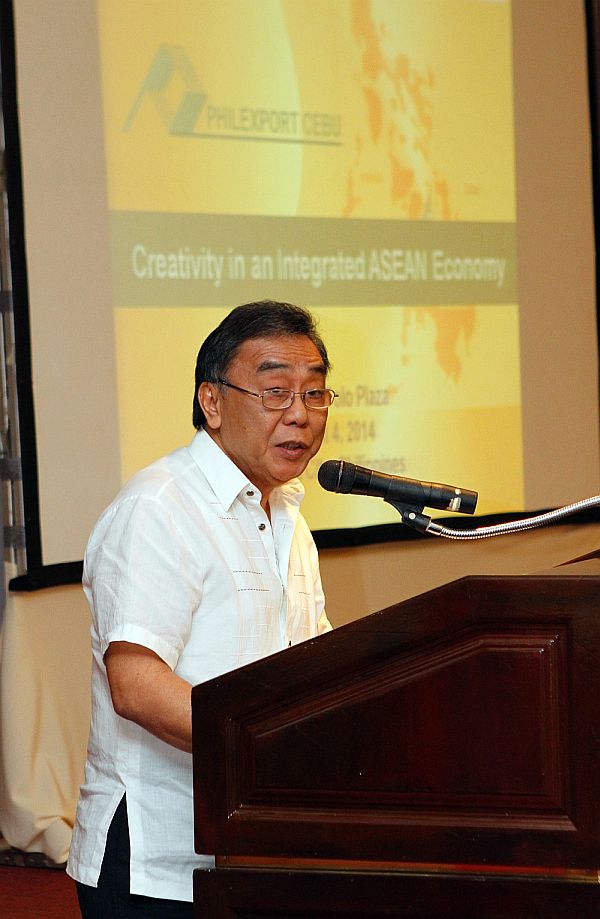Exporters BPOs, OFWs to gain from weak peso

ESCALONA
Exec expects export sales to increase in coming months
While the further depreciation of the Philippine peso against the US dollar seems to paint a generally grim picture, a local business leader cited the “positive” side of this development.
Federico Escalona, executive director at the Philippine Exporters Confederation, Inc. (Philexport) Cebu chapter, said exports will become cheaper and more competitive price-wise while exporters’ earnings will be higher, including windfall profits if the local currency depreciates further.
“Exporters with no imported inputs will benefit the highest,” he said in an interview with Cebu Daily News.
He also said that the export sector would expect sales to pick up in coming months as the Philippine export products become more competitive.
Although export growth had been sluggish in the past year, the trend was positive at least in the first semester of 2017.
“Thus, a weak peso will still make Philippine products competitive,” he said.
Expand market share
With this in mind, he said the sector will try to expand its share in existing markets as well as develop new markets and products through innovation.
“Innovations may be incremental or radical. It can be product innovation or process innovation or, in blue ocean terms, it can be value innovation for buyers’ satisfaction or delight,” he said when asked about what these innovations are.
The peso on Monday shed 10 centavos to finally breach the 51:$1 level and close at 51.08:$1.
It was a fresh almost 11-year low for the peso, the weakest since Aug. 28, 2006’s close of 51.21:$1.
BPOs, OFWs
Aside from exports, Escalona said other sectors that will benefit from the weak peso are dollar-earning industries such as business process outsourcing and contact centers.
Overseas Filipino Workers (OFW) are also seen to benefit from this since their remittances will translate to higher values, which is advantageous to their beneficiaries.
The weakening of the peso will also attract more investments to the Philippines, whether foreign-direct investment or short-term, Escalona said.
However, the Philexport official said importers will find foreign products more expensive, which could lead to import inflation for the Philippines, especially since the country sometimes incurs trade deficits (when an economy imports more than it exports).
Bad for oil imports
Escalona said the weak peso is also bad for oil imports, which will be exacerbated by increases in global crude oil prices as well.
Apart from this, the depreciation of the peso against the dollar also caused the national government’s debt to rise further in June, data from the Bureau of Treasury showed.
The Philippines’ foreign obligations jumped by 5.2 percent in June to P2.231 trillion from P2.119 trillion in the same period last year.
“The increment was largely due to the impact of peso depreciation against the US dollar,” the bureau said in a statement.
Economic fundamentals
Escalona said a weak currency is normally reflected by a country’s economic fundamentals.
“In the case of a weak currency, the country usually has weak economic fundamentals,” said Escalona.
He posited that in the case of the Philippines, government pronouncements on massive infrastructure spending and government subsidies, and the proposal to lower tax rates without clear-cut sources of money to fund these may have contributed largely to the weakness of the peso as well.
The business leader was once a futures trader in Europe based in Amsterdam, trading currency, oil, and precious metal futures in the mid 80s to early 1990s.
“There is really nothing a country can do to control currency movements. The exchange rates are dictated by market forces and no amount of government intervention (risky) can reel in the US$ (and other Forex) at the moment,” Escalona said.
Peso to remain weak
The Philippine peso is expected to remain the worst performing currency in the region until yearend as it bears the brunt of “intensifying” imbalances in the economy brought about by robust growth in recent years, the research arm of banking giant ANZ said.
“The Philippine economy has undergone a structural improvement in the last decade. Potential growth is around 6.5 percent currently, more than double what it was during the 1990s,” ANZ Research economists Sanjay Mathur and Eugenia F. Victorino said in a report titled “Philippines Insight: Intensifying Imbalance.”
However, they added that “the recent period of strong growth has resulted in the build-up of imbalances in the economy, which in our view are intensifying.”
Fundamentals strong
But Valentin Araneta, a member of the Bangko Sentral ng Pilipinas’ (BSP) Monetary Board, said that the fundamentals of the country’s economy remain strong amid the further depreciation of the peso against the dollar.
“You have a strong GDP (Gross Domestic Product) growth fueled by investment so we are stronger in terms of growth than most Asean countries.
Definitely last year, (we were) strongest in Asean,” he said on the sidelines of the BSP’s 24th anniversary celebration in Cebu City on Tuesday.
The Philippines posted a growth rate of 6.9 percent in 2016, the highest in Southeast Asia.
However, he said that the weakening of the peso might indicate that Philippine imports had grown much faster than the rest of the region and even Asia.
In earlier reports, the local currency is seen to continue to plummet as import requirements for the government’s massive infrastructure program drives demand for dollars.
While other countries have import deceleration, he said the Philippines has import acceleration, signifying a trade deficit.
“That is normal in a high-growth economy, fueled by investments and demand in demand is pushed by investment. We need infrastructure, we need to import capital goods,” said Araneta.
Disclaimer: The comments uploaded on this site do not necessarily represent or reflect the views of management and owner of Cebudailynews. We reserve the right to exclude comments that we deem to be inconsistent with our editorial standards.
